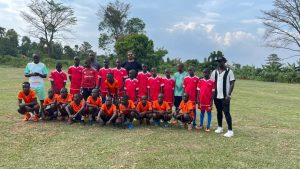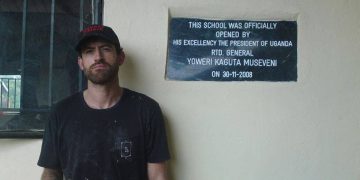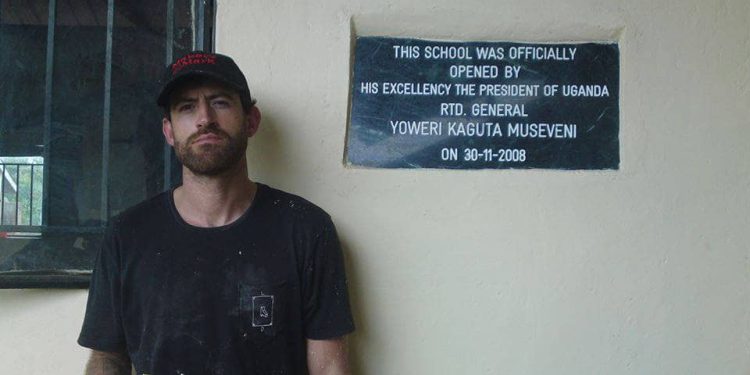In 2008, President Museveni launched the Tasaaga schools in Sitabaale, Nansana Municipality, Wakiso district, which is offering education to the underprivileged communities.
The story of Tasaaga schools, dates 16 years back, after Robin Galan, a British citizen, set his eyes on a letter seeking for help to build a community school.”
Galan says the letter caught his eye. “16 years ago, I decided to come to Uganda, straight to Sitabaale village in Kiwenda, Nansana Municipality, Wakiso district.”
“I found a letter from Burhan on a website called idealists in 2007. I am not sure if it’s still there but it simply said we need a school and I couldn’t find any other opportunities that could challenge me so I came to see Burhan and see if things were legitimate.”
“When I landed, I got overwhelmed with the place. I felt that the place and school, deserved structures that would last years, I started building. I left after the building was complete. It took us six months,” he said.
“I wanted to do things with a planning permission, architect and legitimate. It was two months of planning and learning how things work and four months of construction,” he notes.
Today, with the help of Galan, Mubiru and his team, managed to construct the Tasaaga schools with permanent structures.
Unlike several times when volunteers usually come in teams, Galan explains why he came alone.
“If you think that time is very valuable but the truth is you need to have skills and qualifications to do something useful so I found it hard to find something to do and I didn’t want to come and be told in a team ‘we do this and that,’” he said.
Annually, Galan returns to Uganda.
“When I left, I realized the school is not just a building. It’s the teachers, the parents, the director, the lightning conductor, the toys, the amusements, everything,” he explains.

“When I came, I saw what was on ground, I decided what was needed but it’s never enough. Never enough time for money. I know what we need and what I dream of and it is what I am going to aim for now. I am going to dedicate more time and more of my life to catching up with where we have fallen behind,” he says.
Galan also hints on Permanently settling in Uganda.
“I have been coming back for the last 16 years, I fell in love with Uganda. This is my country now. This is where my best friends are and the people I admire the most. I hope to move here. I have responsibilities back home but I have been coming once or twice a year.”
Funding
“I am not a rich man. The problem is that when you are a Mzungu everybody thinks you are rich,” Galan said, adding:
“I feel like in sixteen years we would have been able to do more but we struggle, we struggle, we struggle. Ever since the pandemic happened, things have been so backward.”
Galan noted that since 2007, he has been coming to Uganda, he however says that it’s hard to raise funds that can run such a project.
“We have success stories and I feel that when I am here. I feel a little bit of satisfaction when I see the children actually learning because that’s what the school is for.”
Galan said that during the pandemic, together with his friend started a UK charity and started trying to raise more funds which he said is hard now because there is a “hole in Mzungu wallet”.
“Our economy is not good and unfortunately two weeks ago our biggest donor passed away. She was the mother of my friend so I have to work very hard now to try and find funding to replace that but what it has resulted in is that we have a good dynamic whereby we are self- sufficient as far as the running of the school,” he said.
“We have a planned extension because our visions are bigger than this. We need more dormitories, we need better housing, we need plaster paint everything, we need to expand in both directions and the secondary school is currently being helped by the American friends of Tasaaga. It’s always been a struggle to find a way to fund it and it’s always been touch and go and now that our biggest donor has passed away, we need to find a different direction,” he added.
Galan has built the school’s primary school from scratch (Nursery to Primary Seven). He has has also provided the school with a tank for clean water. He pays 17 teachers who offer services to the school.
The school, “Tasaaga Primary School”, is a school for the poor. It offers free education to the orphans, children from poor families pay shs 100,000 and those whose parents can afford pay shs 250, 000 for boarding section.
The School started with 60 children but now accommodates over 300 children. Robin is in charge of Tasaaga Primary.
The secondary school section, offers hands on skills technical but it is funded by the Friends of Tasaaga.
30 children sat for their PLE, 8 passed with first grades, 18 in second grade, four passed in third grade.
Robin is a British from the United Kingdom.











